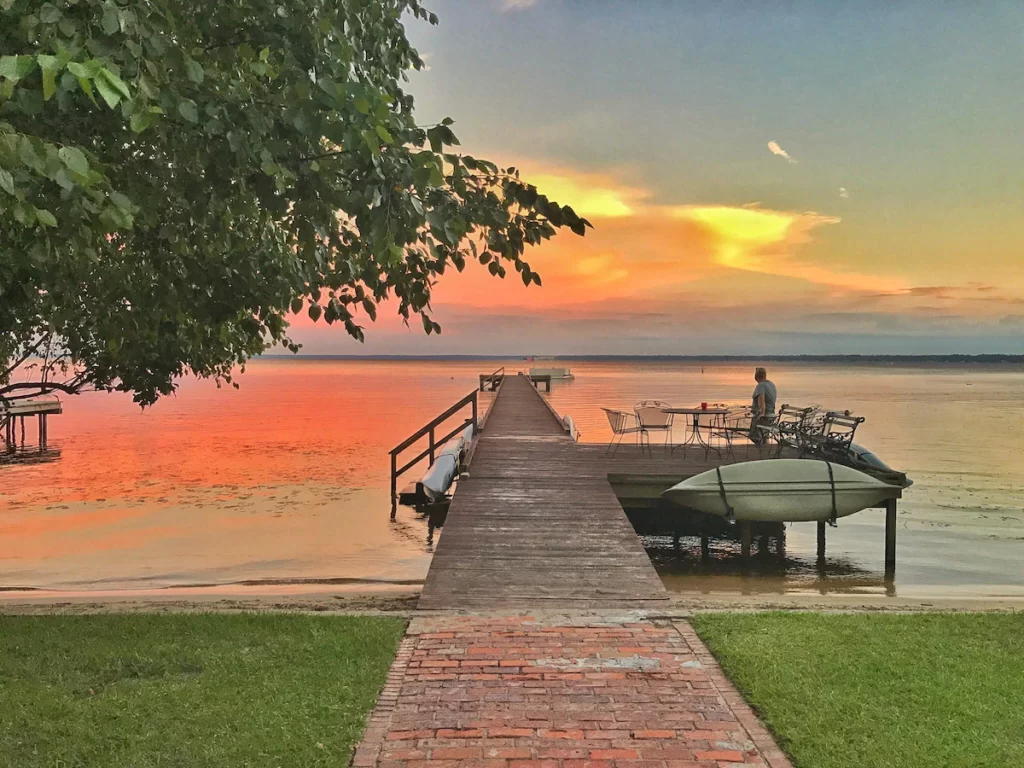HOA Management Services in Terrell, NC
William Douglas Management is a leader in customer service — the experience and expertise that your association needs and deserves!
TERRELL IS AN UNINCORPORATED AREA IN SOUTHEAST Catawba County
Thomasville, NC Facts & Information
Terrell, North Carolina, is an unincorporated area in southeast Catawba County. Because Terrell is unincorporated with no defined municipality borders, the hub of the community is generally considered the area around the crossroads or intersection of North Carolina Highway 150 and Sherrills Ford Road. The name Terrell reportedly originated from the last name of an early Methodist minister of the area.
Terrell Geography: The community of Sherrills Ford is directly to the north. The community of Denver is located to the southeast. The Town of Mooresville is east traveling down North Carolina Highway 150.
Location/Coordinates – Latitude: 35°35′35.12″N, Longitude: 80°57′21.31″W per Google Earth
Elevation above sea level: 758 feet per Google Earth
The telephone area code for Terrell is 828.
Zipcode: 28682
Terrell is probably best identified as the little community up the road from Duke Energy’s Marshall Steam Station on Lake Norman. It may also be identified as the crossroads up the road from the “Hot Hole.” The hot hole is the moniker for the small area of Lake Norman, where warm water is discharged from Marshall Steam Station in the cooling process.
The crossroads are also identifiable by the prominent enterprises at the crossroad, or possibly the enterprises were prominent because there were so few. The historic Terrell Country Store stood at the crossroads for 135 years. Directly across the street from where the Country Store once stood was a small clapboard gas station that was built in the early part of the 1900s and demolished in 2020. Diagonally across the street from where the Country Store once stood is the U.S. Post Office and the Terrell Camping Center, both still standing. Taking a left at the post office, Terrell’s historic Rehobeth United Methodist Church is two hundred yards on the right.
Terrell’s first Rehobeth United Methodist Church was built in 1791. This church was a regional center for Methodism in the 1790s. The church grounds were once home to the first “camp meeting” location in North Carolina. Camp meetings are religious gatherings of worshippers, primarily in rural areas, who congregated in simple or primitive camps for typically a week to live and worship together. The camp meeting held on the Rehobeth church grounds was known as the Grassy Branch Camp Meeting. The organizers established a six-day camp meeting along with a grassy place along a spring back behind the church. Camp meeting organizers then moved this annual camp meeting to Bethel Church in Denver, North Carolina. The Bethel Church camp meeting evolved into the annual camp meeting that is still held at Rock Springs Campground in Denver.
The current Rehobeth United Methodist Church building was constructed in 1889 and remodeled in the mid-1900s. The original church was a frame structure with both a hipped and gabled roof. This original church had a main entrance of two large double-door, paneled doors on the east side. The gables were described as having elaborate woodwork. The church cemetery has graves dating back to the early 1800s.
The Terrell Country Store that was located at the intersection of North Carolina Highway 150 and Sherrills Ford Road was demolished in 2020 for redevelopment. The Country Store was probably the oldest operating retail store in Catawba County. Built by Thomas Franklin (T.F.) Connor in 1885, after he inherited around 1,000 acres in the area. T.F. Connor was a graduate of Catawba College and a successful farmer and merchant. His father, Lieutenant Charles Connor, was a Confederate cavalry officer who was only 25 when he was killed in a Union Army raid in Newton, North Carolina, in 1865. Connor’s grandfather, Major Henry W. Connor, fought in the Alabama campaign against the Creek Indian uprising in 1814. Major Henry W. Connor represented the area when he served in the United States House of Representatives from 1821 until 1841.
The Terrell Country Store was a clapboard building and was an area landmark that housed the Terrell post office for many years. The store has also been home to a hardware store, a real estate office, and an antique store. T.F. Connor sold the store to Harold Gabriel in the 1930s. Gabriel ran the general store until the 1980s. T.F. Connor’s great-grandson, Charles Connor, bought the store in the 1980s and leased it out to different proprietors. As with most traditional general stores, when it was first opened, it carried the staples of the time for the community. In recent years, the store served ice cream, potato chips, and there was a chainsaw artisan in the rear of the store who did magnificent wood sculptures.

Since the first settlers to the area, the economic base of Terrell revolved around agriculture. Growing cotton was the primary cash crop from the 1800s into the 1900s. Cash crops being crops grown for the market. In the mid-1900s, the boll weevil infestation that destroyed many thousands of acres of cotton fields in the south struck Terrell. The infestation devastated the cotton crops for many years, and this is reportedly what led to the decline of farming as an economic driver for the area. This was when many agriculture workers transitioned to seeking work in textile mills in the nearby towns and cities.
The Terrell community is located within the Lake Norman of Catawba CDP. The Lake Norman of Catawba CDP is a census-designated place (CDP) within Catawba County, North Carolina. As of the 2010 U.S. Census, the population was 7,411. An increase from 4,744 as of the 2000 U.S. Census. The Lake Norman of Catawba CDP is within the Hickory-Lenoir-Morganton Metropolitan Statistical Area. As established by the U.S. Census Bureau, the Hickory–Lenoir–Morganton Metropolitan Statistical Area is an area consisting of four counties in the Catawba Valley region of western North Carolina. These four counties being Catawba, Burke, Caldwell, and Alexander. The 2019 U.S. Census-estimated population for the Hickory–Lenoir–Morganton Metropolitan Statistical Area was 369,479. Within the United States, the Hickory–Lenoir–Morganton Metropolitan Statistical Area is the 147th largest based on population.
The area and demographic statistics recognized and defined for ZIP code 28682 – Terrell, North Carolina:
Telephones arrived in Terrell in March of 1900. Thomas Franklin Connor’s residence and the Terrell Milling Co were the first two telephones installed in Terrell.
Directly behind the Terrell Country Store was the R.E. Gabriel cotton gin and warehouse built in the 1800s. The Gabriel family also constructed a grist mill behind the Country Store in the early 1900s.
Terrell received its first post office in October of 1894. A part of the Country Store served as the post office until the post office across the intersection road was built and took over the service.
Another Terrell landmark is the Thomas Franklin Connor house. The home, built in 1886, was designed by Charles Henry Lester, the first architect to reside in Catawba County. The grand home features a tower and is still standing within the Terrell community.
The first effective and permanent bridge across the Catawba River connecting Catawba County and Iredell County was completed in April 1911. This was a one-span toll bridge that connected the communities of Terrell and the road to the Town of Mooresville. The bridge was of steel construction atop concrete pillars. The bridge was built by J.A. Brown and B.A. Troutman, and thus became known as the Brown and Troutman Bridge. The first actual bridge connecting Iredell and Catawba counties was a wooden bridge constructed in 1882. This wooden bridge reached from Iredell County to Monbo or East Monbo, and did not hold up to the traffic and the environment, and was no longer standing by the end of the 1880s.
The tolls on the Brown and Troutman Bridge ranged from five cents for someone to cross on foot to one dollar for farm tractors to cross. The bridge was washed out by the Great Flood of July 1916. The bridge washed out due to the failure of the partially completed Lookout Shoals Dam upriver.
Historical population of Thomasville per the United States Census Bureau
CensusPop.
-Population: 1,129
-Male Population: 554
-Male Percentage of Population: 49%
-Female Population: 575
-Female Percentage of Population: 51%
-Population by Race
White: 1,077/95.4%
African American or Black: 18/1.6%
American Indian or Alaskan Native: 3/0.3%
Asian: 7/0.6%
Native Hawaiian & Other Pacific Islander: 0/0.0%
Other Race: 10/0.9%
Two Or More Races: 14/1.2%
-Education Level of Population, 25 Years of Age or Above
Less than High School Diploma: 82/10%
High School Graduate: 359/45%
Associate degree: 74/9%
Bachelor’s degree: 163/21%
Professional school degree: 0/0%
Doctorate degree: 0/0%
-Population Density People Per Square Mile: 348
-Housing: 693 Dwellings
-Median Home Value: $366,000
-Land Area/Square Miles: 3.25
-Water Area/Square Miles: 2.99
Part-time Worker with Earnings: 162/20%
-Owner Occupied Dwellings: 481
-Median Household Income: $59,107
-Family and Single Households
Two-Parent Family Households: 315/65%
Single Parent or Guardian Households: 41/9%
-Majority Commute Time: 45 to 59 Minutes
Single Person Households: 100/21%
Single with Roommate Households: 25/5%
Work from Home: 67/15%
-Modes of Transportation for Workers Above 16 years of age
Automobile – Car, truck, or van: 395/85%
Retired or Unemployed No Earnings: 318/39%
-Average Commute Time: 20 to 29 Minutes
-Employment Class for Adults
Full-time Worker with Earnings: 329/41%
Public transportation: 0/0%
Taxicab: 0/0%
Motorcycle: 0/0%
Bicycle, Walked, or Other Means: 0/0%
Need Association Management?
Contact Us
How to Start
The Process of Working With Us


REQUEST A PROPOSAL
Request a proposal online or call us directly.


WE WILL REVIEW YOUR CASE
Our team of highly trained professionals will review your case.


RECEIVE A CUSTOM TAILORED PLAN
We will create a customized management plan for your community.


SEAMLESS TRANSITION
We will implement a seamless management transition and integrate our tech.


SIT BACK & RELAX
Enjoy better, affordable and a more reliable, hassle-free management system.




